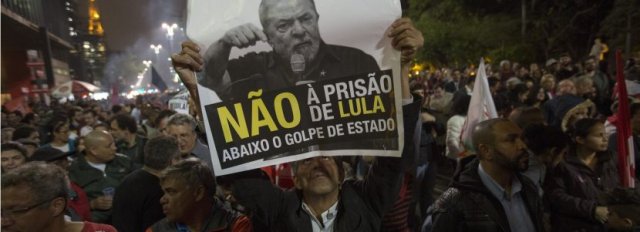
Former Brazilian President Luiz Inacio "Lula" da Silva was sentenced on July 12 to nine years and six months jail over corruption charges in the Operation Car Wash investigations.
Lula was condemned for passive corruption crimes and money laundering. However, prison time has not been applied as the prosecution awaits an appeal. Judge Sergio Moro alleged Lula received about US$1.15 million in bribes.
The ruling could bar him from running as the presidential candidate for the leftist Workers’ Party (PT) in next year’s elections, despite having the highest approval ratings of all candidates.
A Datafolha poll in April showed that Judge Moro, who many are predicting will also run for president, would be tied with Lula in a possible second round of elections.
“President Lula is innocent," Lula's lawyers said in a statement.
“No credible evidence of guilt has been produced, and overwhelming proof of his innocence blatantly ignored. This politically motivated judgement attacks Brazil’s rule of law, democracy and Lula’s basic human rights. It is of immense concern to the Brazilian people and to the international community.”
Harshly criticising Moro's decision to convict Lula, PT parliamentarian Paulo Pimenta said that next year's presidential election “will not be tolerated, nor permitted” without Lula as a candidate.
Brazil's Popular Front, a broad coalition of trade unions, social movements and leftist parties, called for mass demonstrations in response to the ruling.
The 71-year old PT leader can appeal to a federal court but could face time in prison if the judge rules he poses a flight risk or has a concern that the defendant could intimidate witnesses.
If his appeal is not accepted, he could seek an injunction from the Supreme Court. In the case that none go forward, Lula would be prohibited from running for any public office for eight years and could face prison or house arrest.
The ruling came a day after the Brazilian Senate's approval of President Michel Temer's unamended labour reform bill, which has been heavily criticised by trade unions and social movements.
Following Dilma Rousseff's impeachment, in what many regard as a parliamentary coup against the PT president, labour reform became the central pillar of a host of austerity measures and neoliberal policies pursued by Temer’s unelected government.
Temer's reform changes more than a hundred clauses in Brazil's Consolidated Labour Law, which was first introduced in 1943 by President Getulio Vargas. Some of the most devastating aspects, according to lawyer Isaac Yarochewsky, include:
- If a worker is contracted as “intermittent” (article 443), they are not guaranteed the minimum wage, holidays or a Christmas bonus. These will be up to the employer.
- Workers will no longer be able to choose which union represents them. They will be obliged to accept all decisions made by arbitrarily selected unions.
- After collective bargaining negotiations, employers will be legally allowed to eliminate previously established workers' rights.
- If a worker's arbitrarily selected union implements a norm that is damaging to union members, no member will have the legal right to contest the measure in court.
- A worker's physical safety is valued in accordance with each worker's wages. In other words, if a worker suffers an accident at work, (roughly 700,000 occur each year in Brazil) “your life is worth how much you earn” according to article 223-G.
- If a worker, for whatever reason, fails to attend a court hearing related to their accident, the worker will be obliged to reimburse the state for expenses incurred. They will also have to pay the company's legal fees.
- Workers who earn more than $685 a month and are sacked from their position without receiving past wages or a severance package will be required to pay their own legal fees to bring the case to the Justice Department.
- The termination of contracts "by mutual accord" will be implemented. In other words, formal job layoffs will be a thing of the past. Workers can simply be asked to kindly leave the premises.
- Pregnant women will not be protected against working in unhealthy environments. That includes working in noisy, dusty, sunny, and other harmful environments as long as a doctor authorises it.
[Compiled from TeleSUR English.]